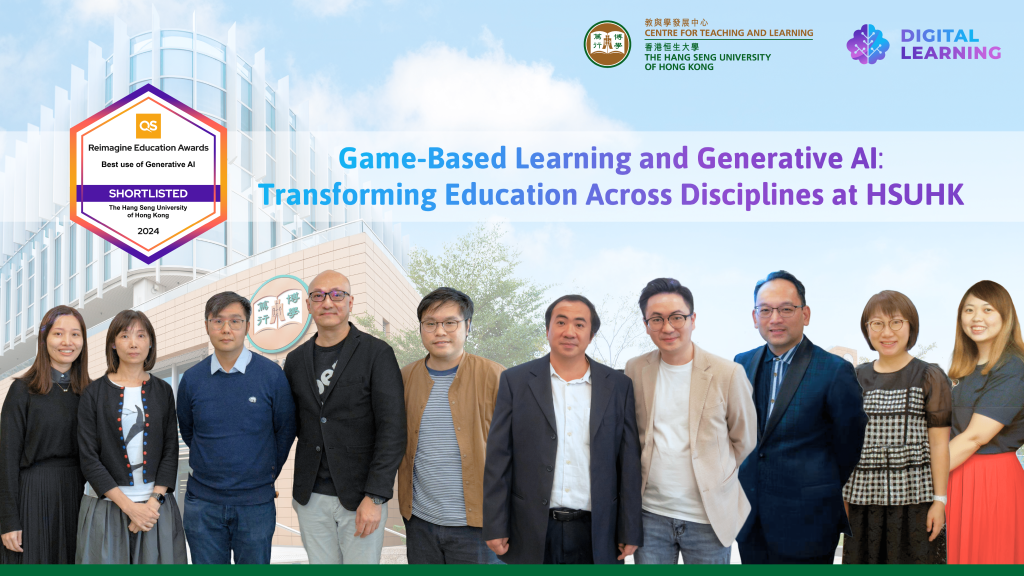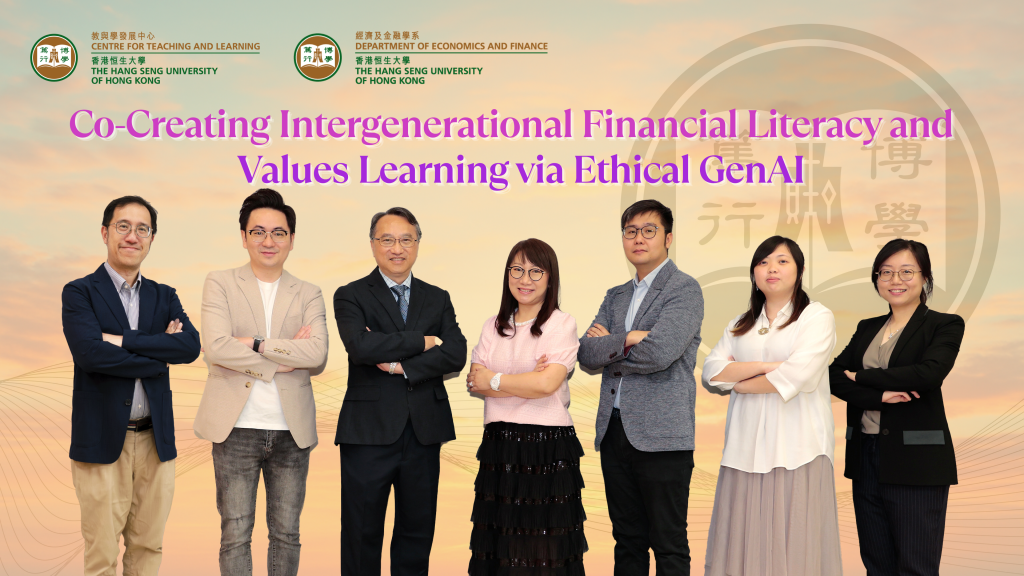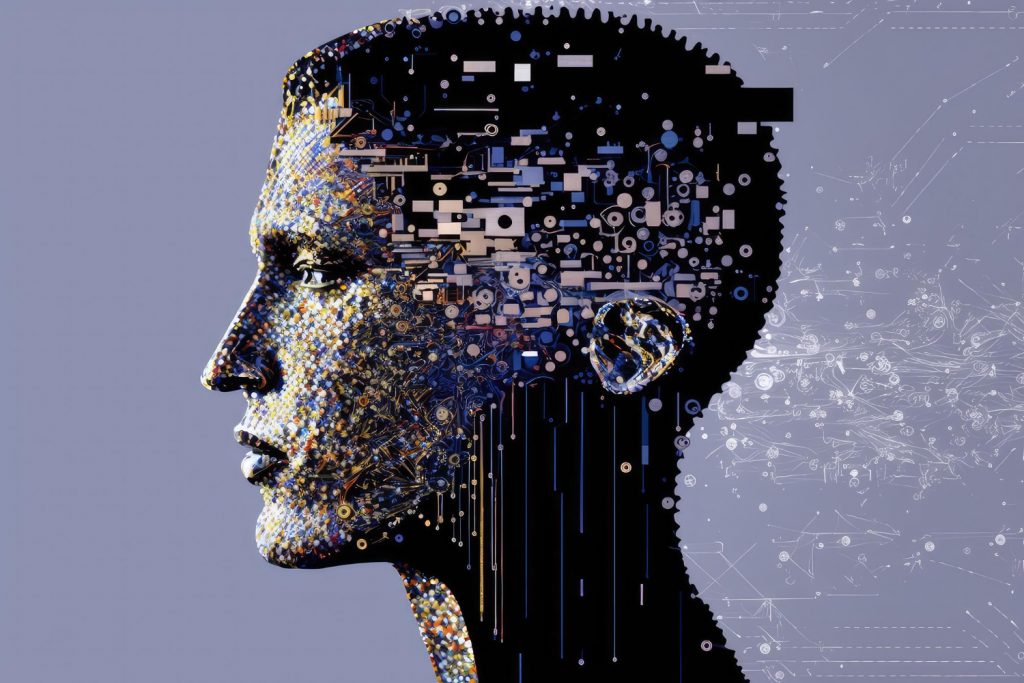
In today’s rapidly evolving educational landscape, technology continues to play a pivotal role in shaping new approaches to teaching and learning. One of the remarkable advancements in this realm is Generative Artificial Intelligence (AI), a technology that holds immense promise for transforming the way we engage with education.
What is Generative Artificial Intelligence (AI)
Generative AI is a subset of artificial intelligence that focuses on creating, generating, or producing new content, ideas, or data that imitates human-like creativity and thinking. Unlike traditional AI, which is designed to perform specific tasks based on existing data, Generative AI has the remarkable ability to autonomously generate novel content by learning patterns from vast datasets.
Potential Applications in Teaching and Learning
The potential applications of Generative AI in the field of Teaching and Learning are vast and exciting. This innovative technology can be harnessed to enhance various aspects of the education process, providing educators and learners with new tools and opportunities.
- Personalised Learning: Generative AI can facilitate personalized learning experiences by tailoring content to individual student needs and learning styles. This technology can adapt and create learning materials that resonate with each student, fostering a more effective and engaging learning journey.
- Content Creation and Enhancement: Educators can leverage Generative AI to create interactive and engaging educational content. From generating multimedia presentations to designing interactive simulations, this technology empowers educators to craft compelling materials that captivate students’ attention.
- Language Learning: Language acquisition is an integral part of education. Generative AI can aid in language learning by providing language practice exercises, interactive conversations, and even real-time translation tools to bridge linguistic barriers.
- Creative Expression and Problem-Solving: Encouraging creativity and critical thinking is essential in education. Generative AI can be used to inspire students’ creativity through artistic creation, writing prompts, and brainstorming sessions.
The University’s Position Regarding the Utilisation of Generative Artificial Intelligence in Teaching and Learning
The Hang Seng University of Hong Kong (HSUHK) is steadfast in its commitment to embracing cutting-edge technologies that elevate educational quality, foster academic advancement, and uphold ethical and responsible practices. In acknowledgement of the necessity for clear guidance and optimal approaches, the Open AI Working Group, a collaborative effort involving various entities such as the Vice President (Learning and Student Experience), Information Technology Services Centre (ITSC), Centre for Teaching and Learning (CTL), Student Affairs Office (SAO), Cloud Innovation School (CIS), Library, and faculty members, has taken the proactive step of devising the Open AI ChatGPT Service. This service is intended to cater to the needs of the university community.
The Open AI Working Group has crafted this guideline with the intention of providing HSUHK members a clear orientation. Its primary objective is to support individuals in effectively and ethically utilizing Generative AI. This pertains to both educators and students. Within this guideline, practical recommendations are outlined for the proficient use of Generative AI tools. Of particular importance is the promotion of academic integrity and the fostering of critical thinking abilities within the university populace. Ongoing assessment of advancements in these tools and their application in educational settings will inform potential revisions to this guideline. Community participation is strongly encouraged, as members are invited to contribute their insights, suggestions, and feedback to the Open AI Working Group (vplse@hsu.edu.hk) regarding this guideline. Such valuable input will play a pivotal role in ensuring the guideline’s ongoing relevance and efficacy.
The Guidelines for Using Generative Artificial Intelligence (GAI) in Teaching and Learning (2023-24) [For Students] offer you a general direction on the use of Generative AI in your learning. They address concerns relating to the ethical and effective use of GAI in the higher education context. The following are the highlights for students’ reference:
HIGHLIGHTS
- Take GAI as an enabling tool for your learning, not a necessity.
- Communicate with your module instructor to understand the expectations and the role of GAI in the module’s assignments and assessments.
- Read the instructions of each assignment carefully and adhere to the guidelines. Clarify with your instructor if you have any doubts or questions about the use of GAI tools for a specific assignment.
- Remember always to acknowledge the use of GAI, if any, and credit the GAI tools that were used, even for tasks such as idea generation and brainstorming.
- Exercise caution in examinations and in-class assessments. Comply with the rules and follow the guidelines from your instructors concerning the use of AI tools.
- Uphold academic integrity. Ensure the originality and authenticity of your work. If you have used GAI in your work, submit the prompt history and indicate your own work on top of the content generated by the AI tool.
- Evaluate the AI-generated content against authoritative sources to attain factual accuracy and avoid potential biases.
- Seek assistance from SAO’s SEN Team or your teachers to access accommodations that facilitate effective use of AI tools if you have special education needs.
- Use HSUHK’s in-house ChatGPT service which offers our students and staff enhanced security and privacy.
- Enhance your digital literacy so that you will be able to make the most of AI tools in your learning.
- Check whether you require permission to use the AI-generated content from the copyright owner, if applicable.
Please click here for the full version of the guidelines.
Resources and Tools for Implementing Generative AI in Teaching Strategies
Incorporating Generative Artificial Intelligence (AI) into teaching strategies opens up a realm of innovative possibilities. To facilitate the integration of this technology into your educational practices, we have curated a collection of valuable resources, tools, and software that educators can explore. These resources are designed to empower you with the knowledge and practical tools needed to leverage Generative AI effectively for enhanced teaching and learning experiences.
In-house HSUHK ChatGPT/DeepSeek Service
It is recommended that HSUHK members utilize the in-house HSUHK ChatGPT/DeepSeek service for their learning needs in case they would like to use the generative AI tools. This service is hosted within the university’s infrastructure, providing enhanced security and privacy.
Past Seminars and Workshops
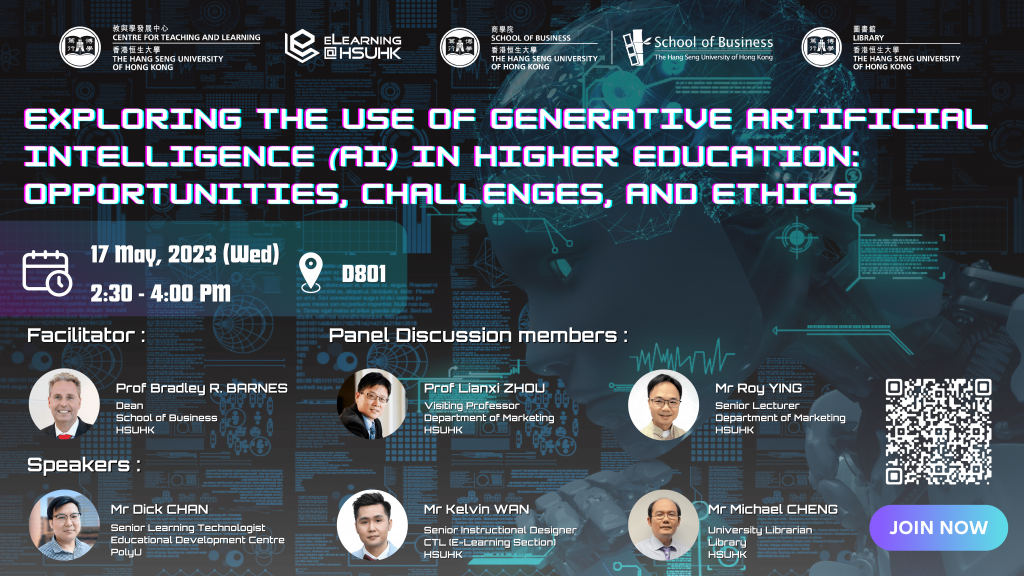
Exploring The Use of Generative Artificial Intelligence (AI) In Higher Education: Opportunities, Challenges, And Ethics
In response to the growing interest and concerns regarding Generative AI, the Centre for Teaching and Learning, the School of Business and the Library jointly organized a seminar on May 17, 2023. The seminar aimed to provide a platform for staff to discuss the potential applications, ethical considerations, and pedagogical implications of Generative AI in higher education.
Event Recording and presentation materials
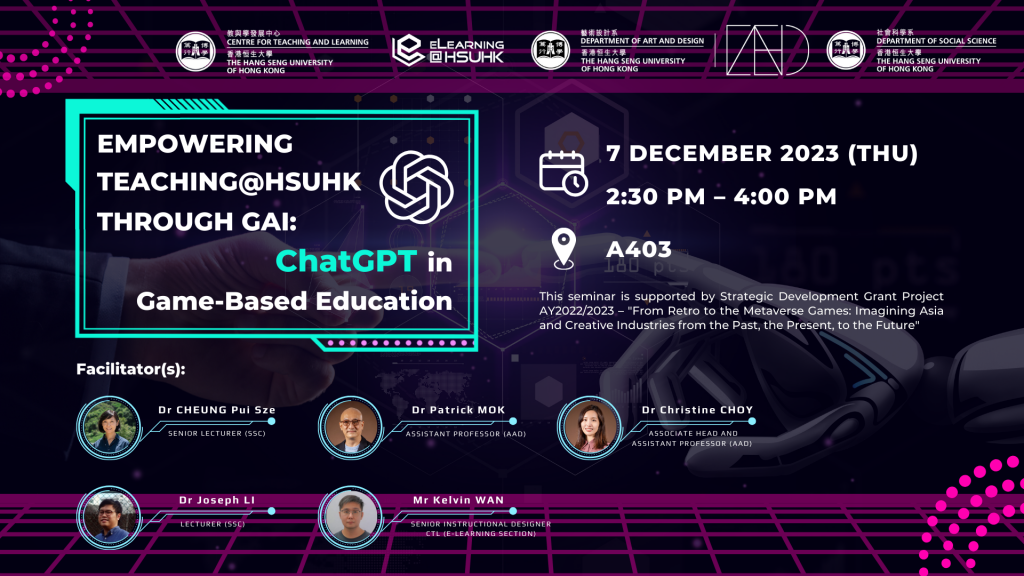
Empowering Teaching@HSUHK Through GAI: ChatGPT in Game-Based Education
In a resounding success, the seminar, co-organized by the Centre for Teaching and Learning (CTL), Department of Art and Design (AAD), Department of Social Science (SSC) and in collaboration with the Strategic Development Grant (SDG) Project “From Retro to the Metaverse Games: Imagining Asia and Creative Industries from the Past, the Present, to the Future” drew over 40 participants on 7 December 2023.
The dynamic event brought together educators and learners in a vibrant community, where insightful presentations and engaging discussions delved into the transformative potential of Generative AI (GAI), with a spotlight on ChatGPT, in reshaping the educational landscape.
Esteemed speakers, including Mr Kelvin Wan (CTL), Dr Pui Sze Cheung (SSC), Dr Christine Choy (AAD), Dr Patrick Mok (AAD), and Dr Joseph Li (SSC), shared their expertise and experiences, sparking a vibrant exchange of ideas among participants. The highlight of the seminar was witnessing the impact of GAI on student projects, from historical narratives to creative ideation, showcasing the incredible potential of GAI and leaving the audience inspired and hopeful for the future of education.
Event Recording and presentation materials

Empowering Teaching@HSUHK Through GAI: Image Generation Strategies
This workshop, “Empowering Teaching Through GAI: Exploring Teaching Materials and Ethical Image Generation Strategies” was held on 28 March 2024 and drew educators and tech enthusiasts alike. Co-hosted by the Centre for Teaching and Learning (CTL), School of Communication (SCOM), and the University Library (LIB) the event delved into the transformative potential of Generative Artificial Intelligence (GAI) in education.
Attendees explored GAI’s role in MOOCs, ethical image generation using platforms like Adobe Firefly, and copyright considerations. Speakers, including Mr Kelvin Wan (CTL), Dr Sobel Chan (SCOM), and Mr Frankie Tsang (LIB), shed light on integrating GAI responsibly into teaching methodologies. The hands-on session allowed participants to create AI-generated images, highlighting both the creative potential and ethical implications.
The workshop fostered dynamic exchanges, emphasizing the importance of responsible AI use in education. This event marked a significant step forward in embracing technology for enhanced teaching and learning experiences, paving the way for future innovations in education at HSUHK.
Event Recording and presentation materials

Rethinking Human Value in Career
The E-Learning Section of CTL, in collaboration with the College Assembly Advisory Committee and the Library, organized an impactful event on 21 March 2024. Centered around the theme “Generative AI – Rethinking Human Value in Career,” the event explored the transformative impact of artificial intelligence on professional trajectories, with a focus on the ethical and responsible use of AI.
Mr Kelvin Wan, Senior Instructional Designer from CTL’s E-Learning Section, alongside Mr Michael Cheng, the University Librarian, delivered a thought-provoking presentation that highlighted the evolving relationship between Generative AI and human value in career paths. Their insights are enriched by interactive elements such as the Kahoot! game engaged attendees, and sparked meaningful discussions. The discussion offered valuable perspectives on the implications of AI in daily life and work.
The event attracted over 500 students, who participated both in-person and remotely via hybrid attendance. This widespread engagement underscored the event’s relevance and significance to the student body, reflecting the commitment of CTL and the Library to fostering interdisciplinary dialogue and preparing students for the challenges of the future workforce.
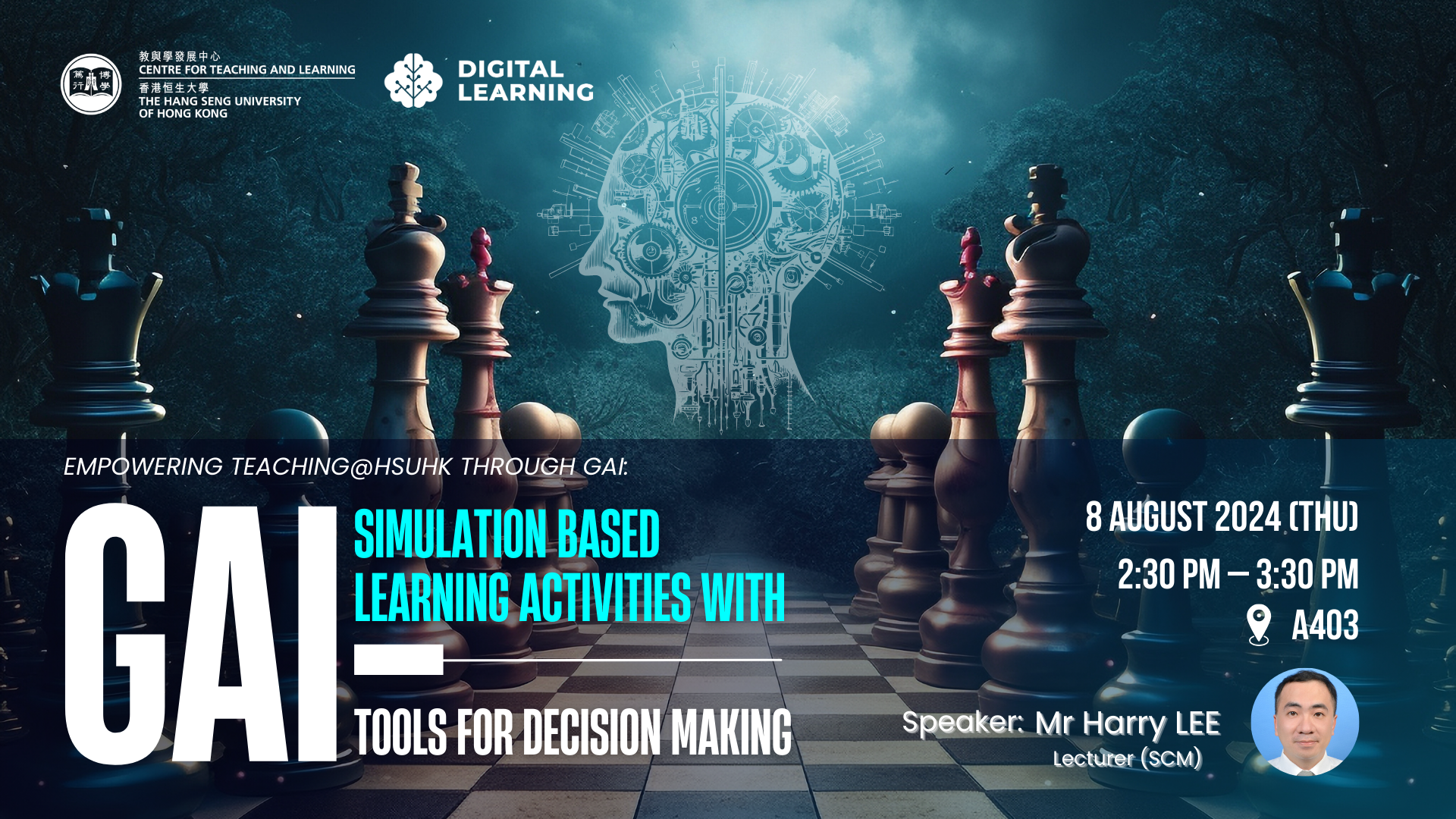
Empowering Teaching@HSUHK Through GAI: Simulation Based Learning Activities with GAI Tools for Decision Making
On 8 August 2024, the workshop “Empowering Teaching at HSUHK Through GAI: Simulation-Based Learning Activities with AI Tools for Decision-Making” brought together educators and tech enthusiasts to explore the transformative potential of Generative Artificial Intelligence (GAI) in education. Hosted by the Centre, the event delved into how GAI can revolutionize decision-making in educational settings through interactive simulations. Participants explored the role of GAI in decision-making using simulation platforms designed for students. Mr Harry Lee from the Department of Supply Chain and Information Management demonstrated how integrating ChatGPT 3.5 can enhance students’ critical thinking. He also invited a student to share their experience of using ChatGPT 3.5 while engaging with the simulation game. Furthermore, Mr. Lee showcased advanced GAI technologies such as text-to-video tools and interactive Student Response Systems, illustrating how decision-making evolves with insights from GPT-3.5 and GPT-4.0.
The workshop fostered dynamic exchanges, emphasizing the empowerment of teaching at HSUHK through the responsible use of GAI tools. By showcasing the practical application of AI in simulation-based learning activities, the event highlighted the potential of GAI to enhance decision-making processes and advance educational practices. This workshop marked a significant step forward in integrating technology into teaching, paving the way for future innovations in education at HSUHK.
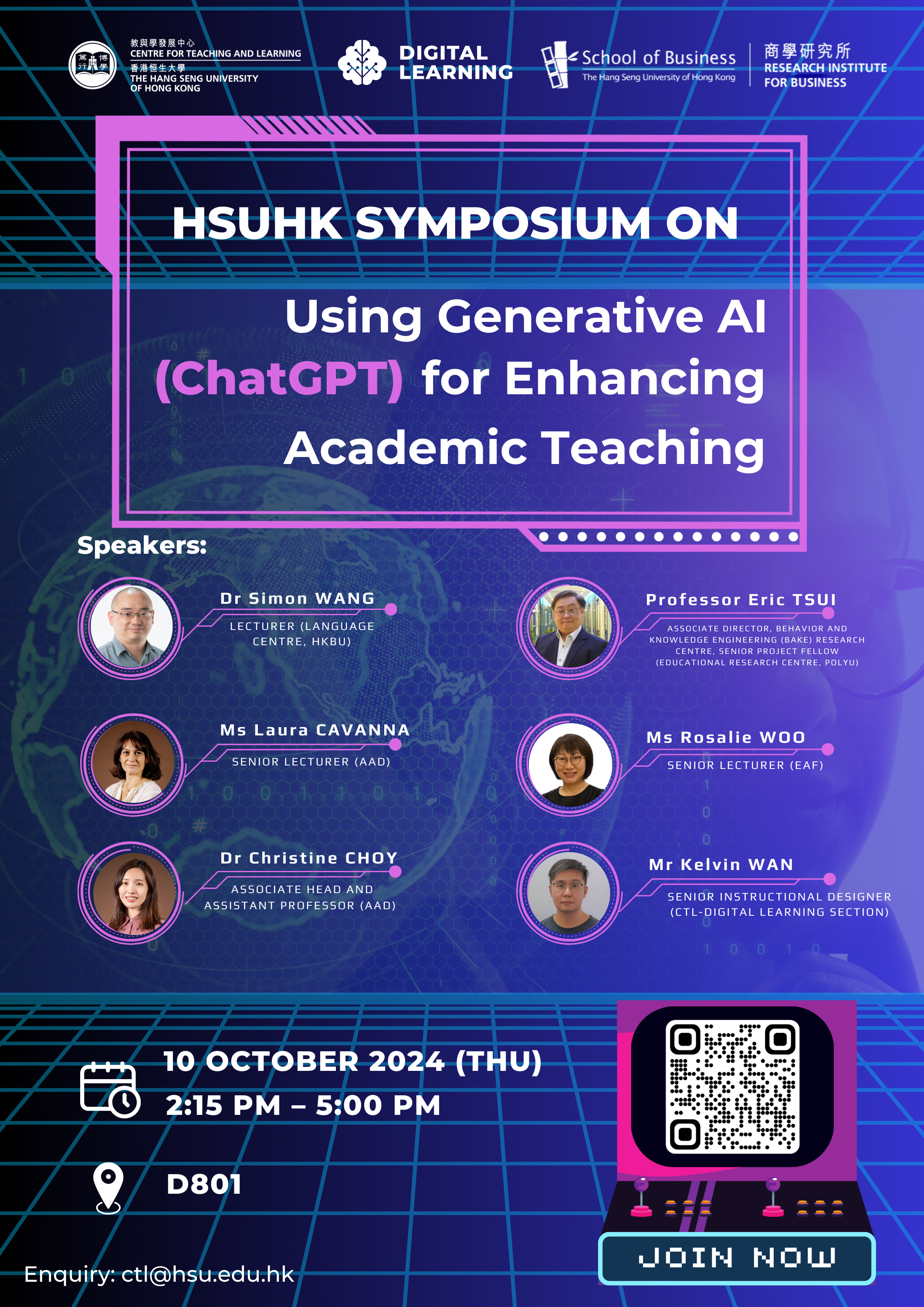
HSUHK Symposium on Using Generative AI (ChatGPT) for Enhancing Academic Teaching
The HSUHK Symposium on Using Generative AI (ChatGPT) for Enhancing Academic Teaching, co-hosted by the Centre for Teaching and Learning (CTL) and the Research Institute for Business (RIB), took place on October 10, drawing about 55 participants. The event featured a mix of presentations and discussions on the role of Generative AI in education. The symposium kicked off with opening remarks by Professor Louis Cheng (EAF, RIB), followed by the first session focusing on teaching and learning with Generative AI. Highlights included Rosalie Woo’s presentation on AI-empowered service-learning activities, where she also brought students to showcase their projects and share their experiences. A joint session by Dr Christine Choy and Kelvin Wan further demonstrated how Generative AI can enhance game-based learning in creativity and cultural heritage. This segment was enriched by Ms Laura Cavanna’s talk on augmenting creativity with AI, culminating in a dynamic Q&A session moderated by Dr Ben Cheng.
The second session, moderated by Professor Louis Cheng and Dr Kenneth Kwong, shifted focus to research on the impact of Generative AI in education. Dr Simon Wang presented findings on the effectiveness of a customized AI chatbot for literature summarization, followed by Professor Eric Tsui’s exploration of gamifying learning with ChatGPT. The symposium concluded with a thought-provoking discussion and closing remarks by Dr Ben Cheng. The event provided participants with practical insights into how AI tools like ChatGPT can transform teaching practices and student engagement, leaving them equipped with strategies to integrate AI into their own educational environments.

GenAI Meets Edutainment – Using GenAI to Create Artistic Images
The GenAI Meets Edutainment series launched on 16 May 2025 with its first workshop, Using GenAI to Create Artistic Images, attracting 58 participants from across the university. The session began with an engaging Kahoot! game where participants guessed whether images were real or AI-generated — a fun and eye-opening activity that set the tone for the afternoon.
Ms Charlotte Lee (Digital Learning Section, Centre for Teaching and Learning) introduced accessible GenAI tools such as Moodle AI, Canva AI, and Runway, guiding participants through their educational applications. Ms Laura Cavanna (Department of Art and Design) provided valuable insights into how visual styles shape storytelling, mood, and learner engagement.
Participants then worked individually to generate AI-created images based on three themed educational scenarios. The session concluded with an interactive Q&A and image-sharing activity using a digital whiteboard, sparking creative discussions and feedback. The workshop successfully blended practical skills with artistic inspiration, setting the stage for future sessions in the series.
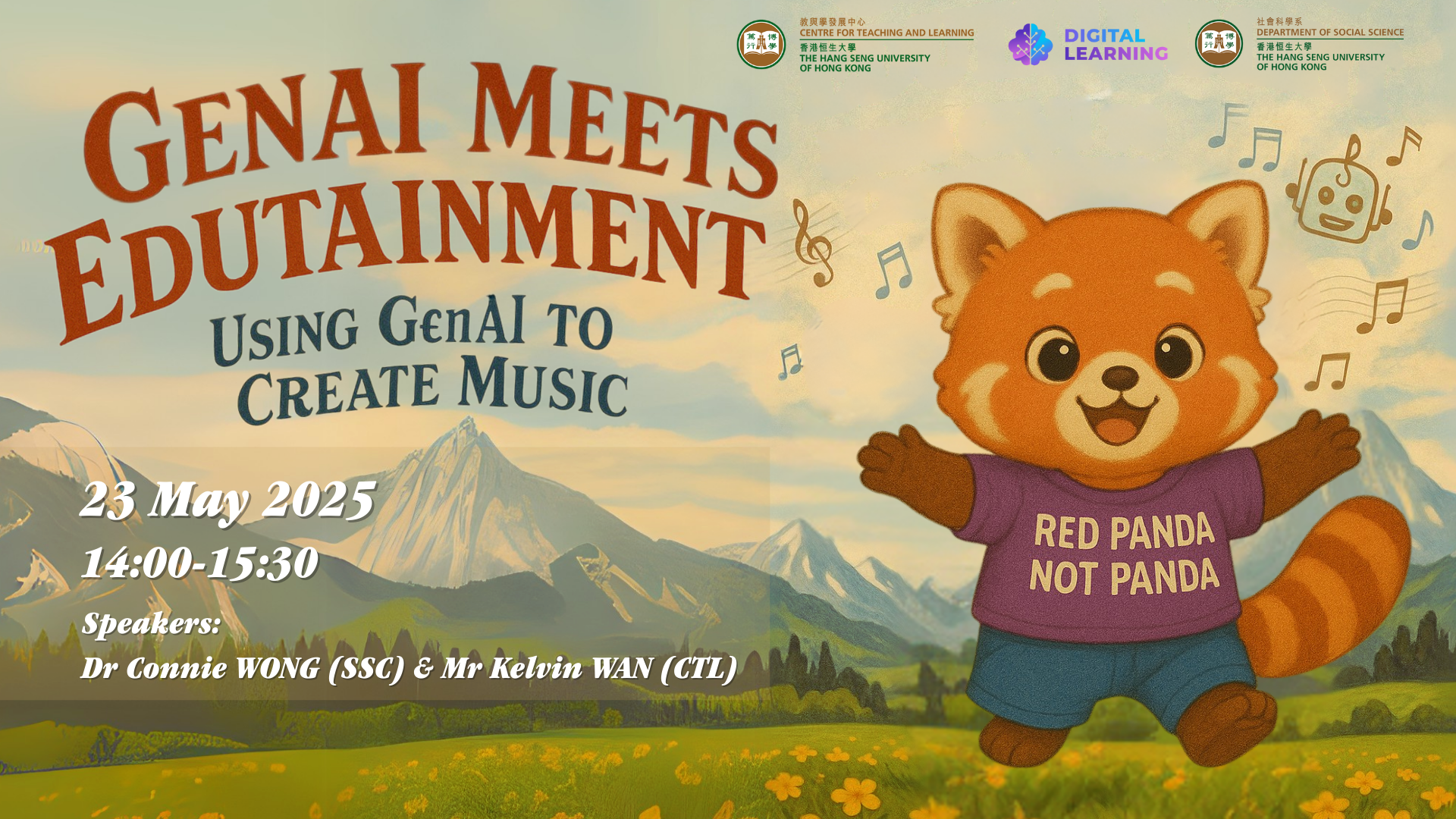
GenAI Meets Edutainment – Using GenAI to Create Music
Held on 23 May 2025, the second GenAI Meets Edutainment series workshop welcomed over 50 academic and administrative staff to explore how music and AI can enhance teaching and learning. Co-facilitated by Mr Kelvin Wan (CTL) and Dr Connie Wong (SSC), the session introduced basic music theory. It demonstrated the use of generative AI tools such as ChatGPT and Suno.ai for composing educational songs. Participants learned how to apply the psychological concept of chunking—breaking down complex content into memorable musical structures. The hands-on challenge invited attendees to create AI-generated songs based on their own module content, sparking creativity and engagement across disciplines. The session concluded with a lively sharing of lyrics and learning reflections. The workshop was well-received and demonstrated how AI-powered music can support inclusive, engaging, and meaningful learning experiences.
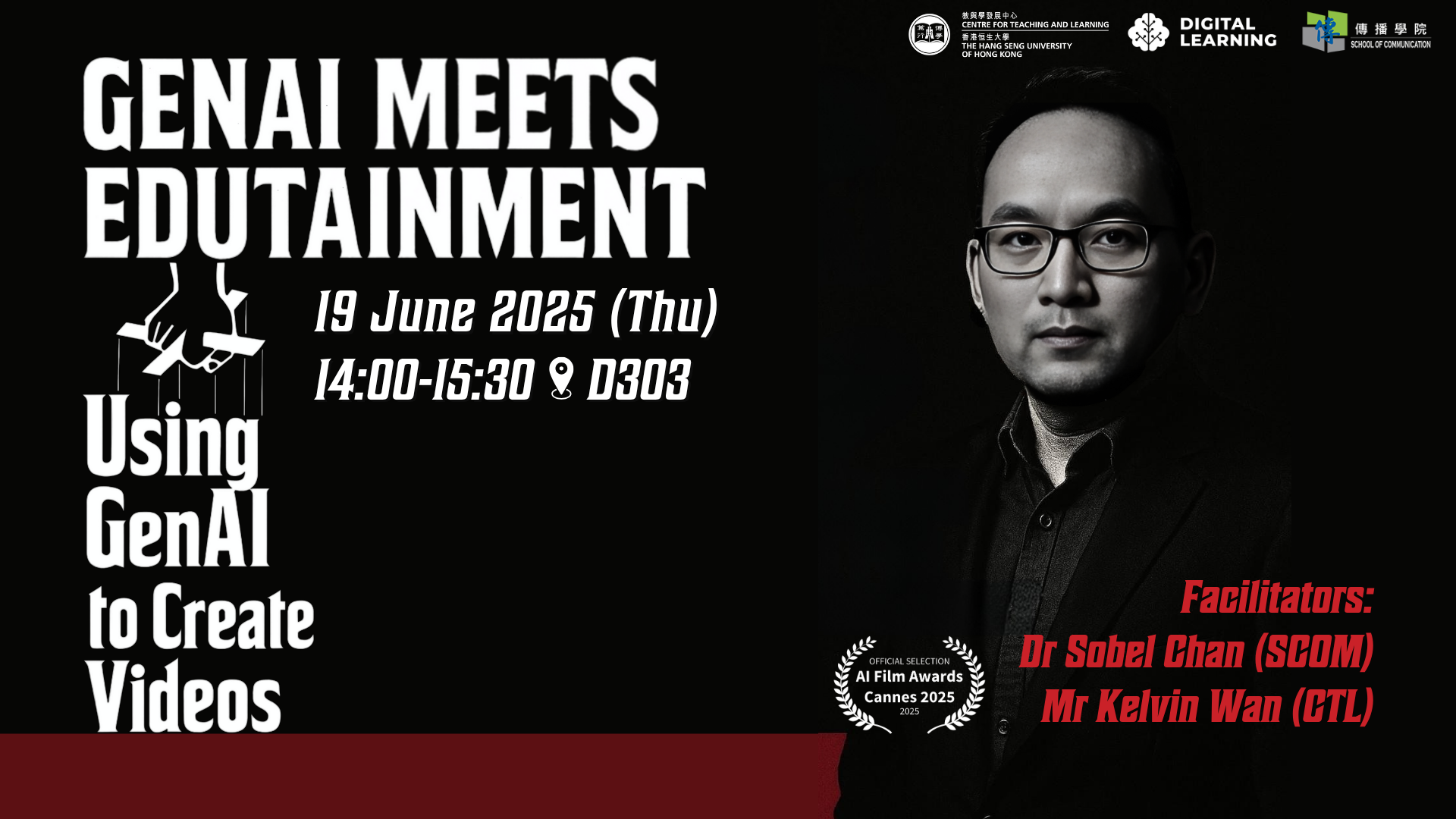
GenAI Meets Edutainment – Using GenAI to Create Videos
Concluding the GenAI Meets Edutainment series, the final workshop—Using GenAI to Create Videos—offered an engaging exploration of how AI-generated video content can enhance teaching and learning. Over 60 participants attended this workshop. Co-facilitated by Dr Sobel Chan (School of Communication) and Mr Kelvin Wan (Digital Learning Section), the session began with an interactive Mentimeter poll on the elements of effective educational videos. Mr Wan showcased real-life applications such as student-made game trailers, MOOC introductions, and award application video. He also introduced various AI video creation tools and compared their pedagogical applications. Dr Chan then led a hands-on demonstration and walkthrough on video editing. Participants applied their learning in a creative exercise, followed by an open sharing session. The workshop wrapped up with rich discussions on how AI can support narrative-driven learning, concluding the series on a high and inspiring note.
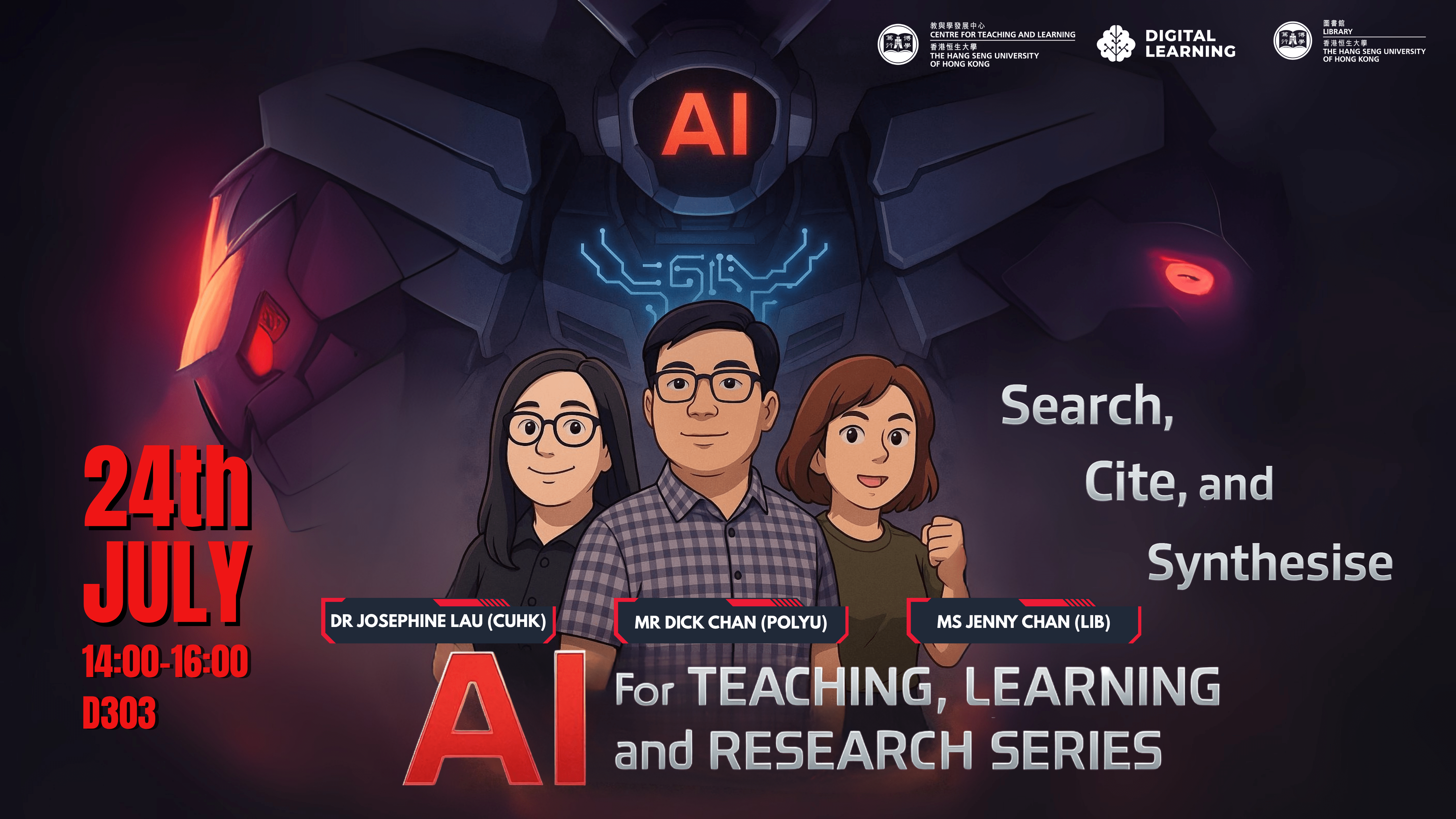
AI Tools for Teaching, Learning and Research: Search, Cite, and Synthesise
The first session of the AI Tools for Teaching, Learning and Research workshop series, titled “Search, Cite, and Synthesise,” was successfully held on 24 July 2025 in D303. With 56 participants joining us — nearly a full house in D303! The session brought together teaching staff, academic support teams, and professional colleagues from across campus.
Speakers Dr Josephine Lau (CUHK), Mr Dick Chan (PolyU), and Ms Jenny Chan (HSUHK Library) introduced practical AI tools including Perplexity, NotebookLM, and Scite.ai, demonstrating how these tools can support academic workflows such as literature search, content synthesis, and citation evaluation.
The hands-on demonstrations and real-life use cases sparked engaging discussion, and participants appreciated the beginner-friendly, practical approach to AI integration in daily academic tasks.
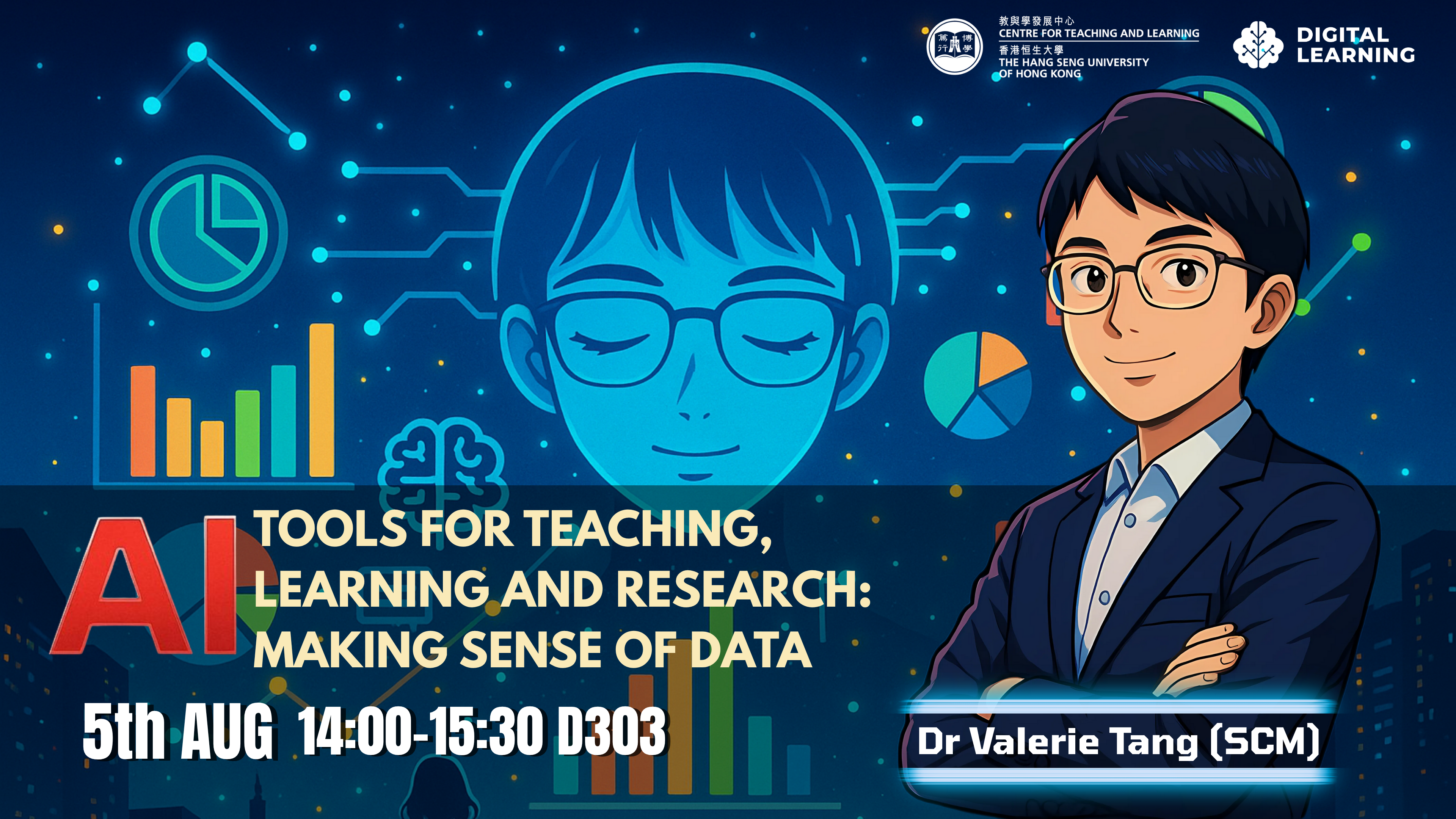
AI Tools for Teaching, Learning and Research: Making Sense of Data
The second session of the AI Tools for Teaching, Learning and Research series, titled “Making Sense of Data,” was held on 13 August 2025 in D303.
Led by Dr Valerie Tang, the workshop introduced practical AI tools that help educators and researchers explore, analyze, and interpret data without requiring programming experience. Dr Tang’s demonstrations highlighted accessible features for non-technical users, along with real-world examples of AI-assisted data analysis in academic contexts.
Participants gained useful tips from the live demonstrations and tool overviews, learning how AI can be applied to streamline data analysis tasks in teaching and research. The beginner-friendly approach and practical focus were well-received, offering valuable insights for those looking to work more effectively with data.
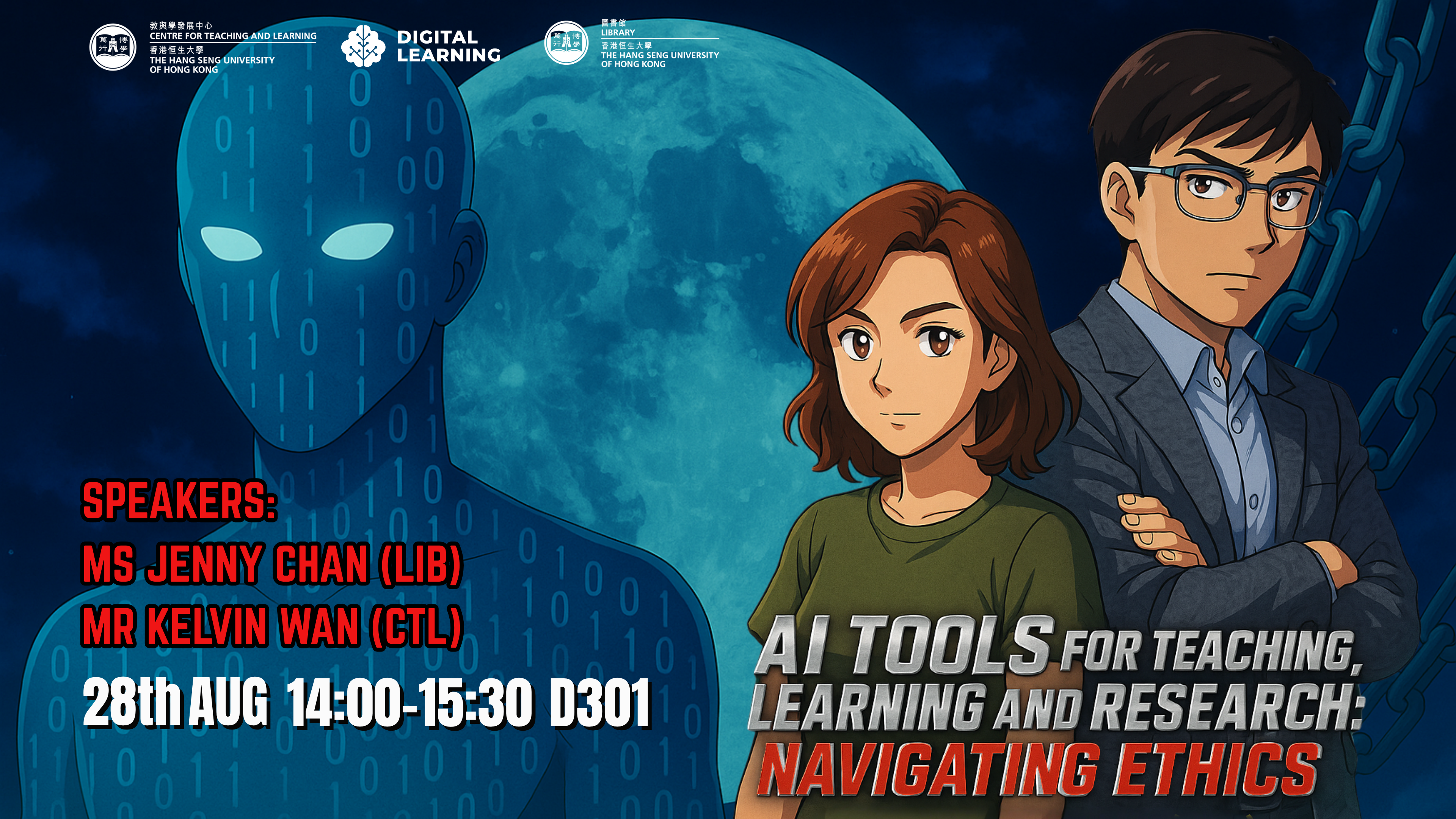
AI Tools for Teaching, Learning and Research: Navigating Ethics
On 28 August 2025, the final chapter of the AI Tools for Teaching, Learning and Research series: Navigating Ethics — gathered 20 participants in D301 to reflect on the responsible use of Generative AI.
Co-facilitated by Ms Jenny Chan (LIB) and Mr Kelvin Wan (CTL), the workshop explored the ethical dimensions of using Generative AI in academic contexts. The session highlighted institutional guidelines, addressed common concerns, and shared real examples of responsible practice in teaching, learning, and research.
Participants gained practical insights into balancing innovation with accountability, and how staff across disciplines can promote responsible AI use. The workshop concluded the series on a thoughtful and forward-looking note, underscoring the importance of ethical awareness as AI becomes an integral part of academic work.
Your AI Study Buddy – Master Learning with Perplexity & NotebookLM
The workshop introduced students to three Generative
AI tools – In-house ChatGPT, Perplexity, and NotebookLM –
highlighting how each supports different stages of the learning process.
Students also experimented with changing output languages and applied Bloom’s Taxonomy to create AI-generated quiz questions that promote deeper learning and critical thinking.
Data Analytics Workshop: Think
with AI, Visualise with Tableau
The Financial
Data Analytics Workshop – Analyse with AI, Visualise with Tableau was
jointly organized by the Centre for Teaching and Learning (CTL) and the
Department of Economics and Finance (EAF). The workshop featured two sessions:
Mr. Kelvin Wan (CTL) introduced AI-powered data analytics tools, followed by
Dr. Jason Liao (EAF), who demonstrated financial data visualization using
Tableau. Held at the Bloomberg Trading Lab (A405), the event provided students
with practical, hands-on experience in applying data analytics to finance. The
collaboration between CTL and EAF strengthened interdisciplinary learning and
set a foundation for future joint initiatives.
Smart Workflow A-B-C Series (Workshop 1): Automating
Everyday Tasks with AI
The
inaugural session of the Smart Workflow A-B-C Series – Automating
Everyday Tasks with AI drew a full-house audience of
administrative colleagues eager to explore how AI-powered tools can simplify
daily operations.
Led
by Dr Valerie Tang (SCM) and co-facilitated by Mr
Kelvin Wan (Digital Learning Section), the 90-minute hands-on workshop
introduced practical ways to streamline repetitive tasks using familiar
Microsoft 365 applications.
Play to Learn, Game to Innovate workshop series: From
Classroom to Boardroom: Transformative Learning Through Strategic Role-Play and
Real-World Problem Solving
Drawing
from her extensive academic experience at King’s College London and the
Hong Kong Polytechnic University, Valentina Chan shared how immersive role-play
simulations can replace traditional lectures, enabling students to
tackle authentic, multidisciplinary challenges. Participants experienced
how students act as consultants to address real-world
corporate and societal issues, presenting solutions to diverse stakeholder
panels — from business executives to NGOs.
Throughout
the session, Tina illustrated how Generative AI can serve as a
“collaborative team member” — helping students brainstorm ideas,
analyse case data, and simulate stakeholder perspectives while still
maintaining critical thinking and academic rigour.
Play to Learn, Game to Innovate workshop series: Using
E-Games to Engage Students in General Education Subjects
The
Centre for Teaching and Learning (Digital Learning Section) hosted the second
session of the “Play to Learn, Game to Innovate with GenAI” workshop series,
“Using E-Games to Engage Students in General Education Subjects,” led by Dr Zoe
Xiao from the Department of Applied Social Sciences on 11 Dec 2025.
In this interactive workshop, Dr Xiao shared her team’s experience in designing a series of role-playing E-games for a General Education subject — demonstrating that meaningful game-based learning is achievable without advanced IT expertise. She highlighted how Generative AI played a facilitating role throughout the design process, supporting ideation, content development, and refinement of gameplay elements.
Address Academic Integrity
- To reinforce the significance of original work, it is recommended to provide practical examples of appropriate attribution and citation when utilizing Generative AI tools. More information about academic integrity, citing Generative AI tools, and avoiding plagiarism can be found on the CTL and Library websites.
- Citing ChatGPT: https://libguides.library.hsu.edu.hk/genaiforlearningandresearch/cite
- Recording usage of ChatGPT: https://libguides.library.hsu.edu.hk/genaiforlearningandresearch/record
- Avoiding-Plagiarism: https://libguides.library.hsu.edu.hk/Referencing_and_Citation/avoiding_plagiarism
Other Resources
Integrating generative AI in teaching and learning at the university level can offer exciting opportunities for both educators and students. Here is some pedagogical sharing from different universities’ faculties to incorporate generative AI in teaching and learning:
- Pedagogic strategies for adapting to generative AI chatbots. Standford Teaching Commons.
- Integrating Generative AI in Teaching and Learning. Center for Engaged Pedagogy, Barnard College.
- Incorporating Generative AI in Teaching and Learning: Faculty Examples Across Disciplines. Centre for Teaching and Learning, Columbia University.
- ChatGPT and Other Artificial Intelligence (AI) in the Classroom. Digital Futures Institute, Teachers College.
- Considerations for AI Tools in the Classroom. Columbia University Center for Teaching and Learning.
- Thinking About Assessment in the Time of Generative Artificial Intelligence. Digital Futures Institute, Teachers College
- Open AI Educator FAQ. Open AI.
Our Projects
At HSUHK, we are actively exploring how Generative AI can enrich teaching and learning through innovative, real-world applications. This section highlights a range of interdisciplinary projects—from game-based learning and service engagement to AI-powered simulations and creative storytelling—that empower students and staff to co-create meaningful educational experiences with GenAI. These initiatives exemplify our commitment to ethical, impactful, and future-ready education.
Project Team Members from left to right: Dr Choy Hiu Ying, Christine (AAD); Dr Cheung Pui Sze (SAO); Mr Wan Tsz Hin, Kelvin (CTL); Dr Mok Kin Wai, Patrick (AAD); Dr Li Cho Kiu, Joseph (SSC); Mr Lee Wai Yip, Harry (SCM); Dr Ho To Sum, George (SCM); Dr Chan Ka Lok, Sobel (SCOM); Ms Woo Yan Yin, Rosalie (EAF); and Ms Lee Ching Ching, Charlotte (CTL).
Game-Based Learning and Generative AI: Transforming Education Across Disciplines at HSUHK
The project “Game-Based Learning and Generative AI: Transforming Education Across Disciplines at HSUHK,” led by Ir Dr George Ho and Mr Kelvin Wan, Associate Director and Digital Learning Specialist of the Digital Learning Section, was shortlisted for the Best Use of Generative AI award at the 2024 QS Reimagine Education Awards. Launched in 2023, the project encompassed multiple modules, including cultural heritage and finance, grounded in the GenAI-Driven Game-Based Experiential Learning Framework. Over 600 students actively designed educational games, utilising Generative AI to enhance storytelling and game mechanics. This initiative provided a hands-on learning experience, enabling students to address real-world challenges and develop critical skills such as collaboration, ethical reasoning, and creative problem-solving.
Building on its initial success, the project was set to expand in its second year with the launch of a MOOC titled “From Concept to Classroom: Educational Game Design with Generative AI”. This course aimed to equip educators and students with the skills and knowledge to implement game-based learning methodologies using AI.
Project Team Members from left to right: Dr CHAN Chi Ming, Victor (SSC); Ir Dr HO To Sum, George (SCM); Dr CHENG Ka Ming, Ben (EAF); Ms WOO Yan Yin, Rosalie (Principal Team Leader, EAF); Mr WAN Tsz Hin, Kelvin (Co-Team Leader, CTL); Ms LEE Ching Ching, Charlotte (CTL); and Ms YIP Wai Yee, Waii (CTL).
Co-Creating Intergenerational Financial Literacy and Values Learning via Ethical GenAI
This interdisciplinary project empowers students to ethically co-create with Generative AI in support of elderly communities. Grounded in service-learning and guided by frameworks like Kolb’s Experiential Learning and OBTL, students design age-appropriate resources—including educational games, scam prevention kits, and simplified finance materials—for older adults. Throughout the process, students reflect on ethical AI use, empathy, and responsible communication. A dedicated MOOC and AI chatbot support student learning and design decision-making. Looking ahead, learning analytics will be used to trace value development during creation. The project fosters deep engagement, intergenerational connection, and the formation of socially responsible, future-ready graduates.
Continuous Evaluation and Improvement
We encourage HSUHK members to assess the effectiveness of AI-generated content and tools, seeking feedback from teachers, students, and other members. This iterative process ensures that AI remains a valuable asset in education, evolving to meet the ever-changing needs of our learning community.

